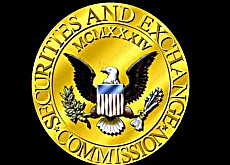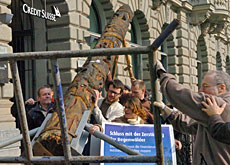Swiss firms irritated over SEC blacklist

The United States regulator has published a list of the world's biggest companies, including three Swiss firms, suspected of sponsoring terrorist states.
Syngenta said it was disappointed with the US Securities and Exchange Commission (SEC), while ABB and Credit Suisse played down their business links with the five named countries – Cuba, Iran, North Korea, Sudan and Syria.
The SEC last week launched a website link aimed at exposing companies which could be “indirectly subsidising a terrorist state”.
The list is based on latest annual reports of the companies. They are mostly non-US and include Unilever, Cadbury, HSBC, Nokia, Siemens and Total, as well as the second biggest Swiss bank, Credit Suisse, the agrochemical firm, Syngenta, and the engineering group, ABB.
Syngenta said it was disappointed that it was punished for its transparency. The Basel-based company is active in four of the five countries designated by the US State Department as “sponsors of terrorism.”
“But we see no reason to change our policy,” said Syngenta spokesman Medard Schoenmaeckers on Sunday.
He added that the company’s business activities in Sudan’s agriculture sector were “minimal”.
Withdrawn
Credit Suisse, which features on the list of all five “rogue states”, did not comment the SEC policy.
A bank spokesman added that Credit Suisse had withdrawn from Cuba and Iran at the beginning of 2006.
For its part, ABB said an “information offensive” was needed to explain its position to investors. The engineering group has been doing business with Iran, according to the SEC list.
The company added that it had withdrawn from Sudan after investors expressed concern over the business activities with the war-torn African country.
ABB’s business activities with Iran will continue but account for less than one per cent of the company’s sales, according to spokesman Wolfram Eberhardt.
The Financial Times newspaper last week reported that many companies are objecting because the list does not make clear the extent of a company’s business in such states or whether they still have ties.
The Organisation for International Investment, which represents 1,200 foreign companies with US listings, said the blacklist had no threshold for judging whether a company was doing “a material level of business in a country.”
swissinfo with agencies
The US is the second biggest buyer of Swiss services behind Germany.
Swiss exports to the US reached SFr20.4 billion ($16.7 billion) last year, up 17% on 2005.
Switzerland is the 15th importer of US goods.
US exports to Switzerland stood at SFr10.9 billion last year, up 31.5% on 2005.
About 20% of Swiss investments are placed in the US.
The term was coined by the Reagan administration and describes countries which systematically violate international law.
These states are considered a threat to world peace, undermining democratic values by sponsoring terrorism or developing weapons of mass destruction.
Initially the list included Iraq, North Korea, Cuba, Iran, Syria, Libya and Sudan. Libya and Iraq have been dropped from the list in the meantime.
The US is trying to put blacklisted countries under pressure by imposing military or economic sanctions. The restrictions can also be applied to companies doing business with these countries.

In compliance with the JTI standards
More: SWI swissinfo.ch certified by the Journalism Trust Initiative











You can find an overview of ongoing debates with our journalists here . Please join us!
If you want to start a conversation about a topic raised in this article or want to report factual errors, email us at english@swissinfo.ch.